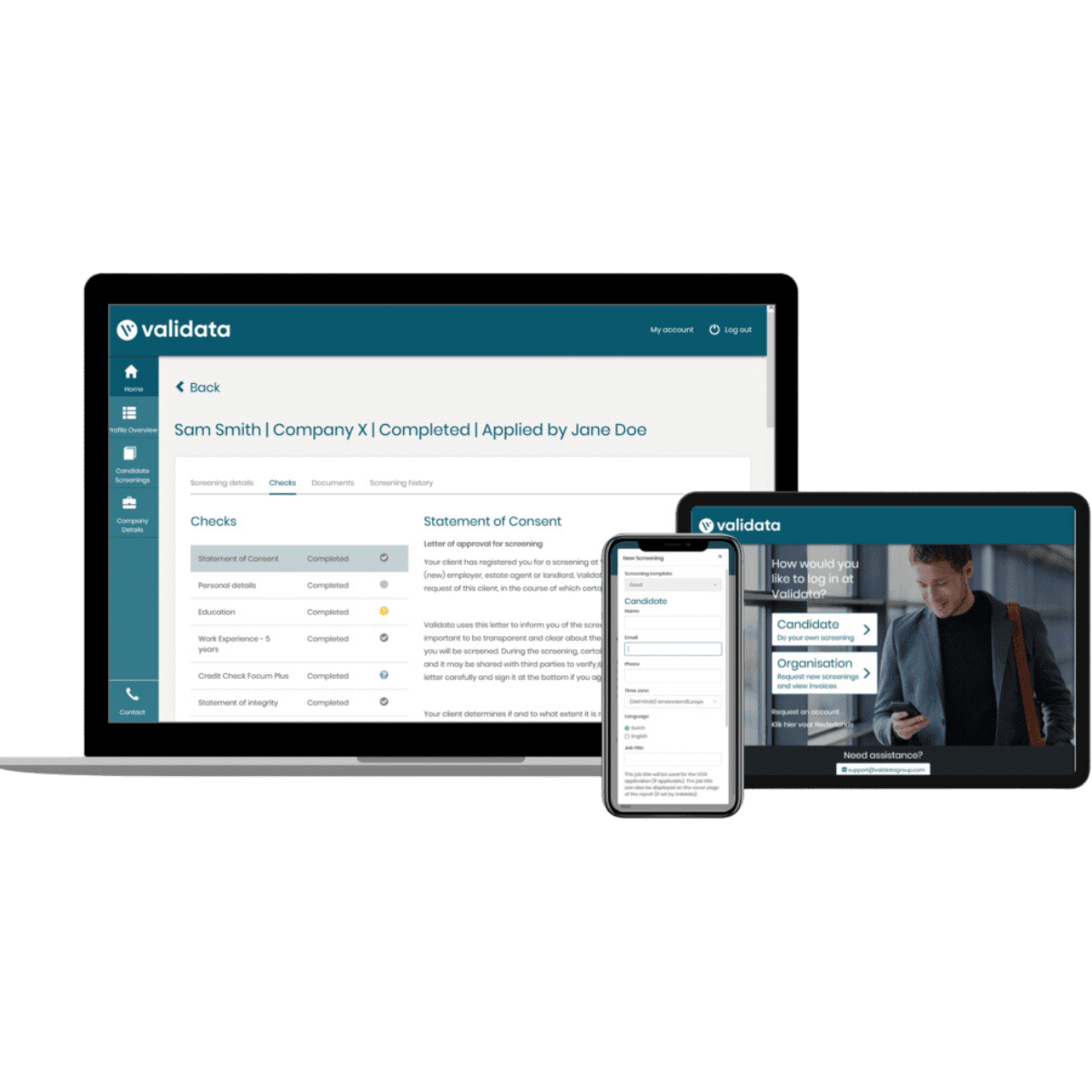
What is a background check?
Running a background check involves collecting and analysing information about an individual’s past. This can include, for example, checking criminal history, previous employment and education. The purpose of a background check is often to ensure that the person is suitable for a particular position but also to mitigate risks around sensitive positions or teams.
Why do background checks?
Background checks can be crucial for companies when hiring, as they help to ensure a safe and reliable working environment. By reviewing the history of potential employees, companies can avoid hiring candidates who may pose risks to security, reputation or operations. This is particularly relevant for positions that involve working with children, handling finances or accessing sensitive information.
Furthermore, background checks help to verify that candidates actually have the qualifications they claim to have, which is key to maintaining the quality of the work. Background checks also reduce the risk of fraud and theft within the organisation, especially in roles with financial responsibilities. In other words, background checks are carried out as part of an organisation’s risk management and to better inform decisions in the process.
Learn more about background checks. Download our white paper below.
Who can carry out background checks?
Employers can carry out background checks as the final part of the recruitment process. However, they must comply with the General Data Protection Regulation (GDPR) and the Swedish Discrimination Act. The employer must also inform the applicant about the background check but does not need to get the applicant’s consent.
Still have questions about how to go about background checks in employment? Don’t hesitate to contact us!

What is checked in background checks?
A background check contains several different elements depending on the type of position you are hiring for. Some common elements that are often checked include the following:
Verification of ID documents
In a background check, verification of ID documents is an important part as it ensures that the person is really who they claim to be. By checking official identity documents such as a passport of a national ID card, the employer can confirm the candidate’s identity. This is particularly important to prevent identity fraud and to ensure that any other information gathered during the background check, such as educational or employment history, actually applies to the person in question. Residence and work permits should also be checked. This is because the employer may have to pay large fines if it turns out that employees cannot produce valid ID documents and work permits in Sweden.
Credit checks on employment
A credit check is an important part of the background check for certain positions, especially those involving financial responsibility or management of company finances. By reviewing a candidate’s credit history, employers can get an idea of the person’s financial stability and sense of responsibility. Credit checks help employers reduce the risk of financial fraud, misuse of company resources and other related security risks. They provide an insight into whether a candidate has demonstrated the ability to manage their own finances, which can be an indication of their ability to responsibly manage the company’s financial assets.
Criminal record check
Criminal record checks are a key part of background checks, especially for positions where integrity and trustworthiness are crucial. By reviewing a candidate’s criminal record, employers can identify any previous offences that may be relevant to know for the current employment. This is important to protect the company, its employees and customers from potential risks. For positions that involve working with children, access to sensitive information or significant financial responsibility, this check is particularly critical. Checking criminal records helps employers make informed decisions about a candidate’s suitability and reduces the risk of future problems related to workplace safety and trust.
Verification of education and training
Checking a candidate’s education means verifying the academic credentials and qualifications that a candidate has indicated in their CV or during the interview. Ensuring that a candidate actually has the degrees and certificates they claim to have is important to maintain high standards and to ensure that all employees have the knowledge and skills required for their roles. By checking educational backgrounds, employers can protect themselves against fake diplomas which are unfortunately relatively common today.
Verification of work experience
Checking work experience means confirming the professional experience and employment listed by a candidate in their CV. This includes verifying periods of employment, positions and duties with previous employers. Ensuring that a candidate’s work experience is accurate and authentic is not only crucial to assessing their suitability for the role in question, but also their level of honesty. By carefully reviewing a candidate’s work experience, companies can make more informed hiring decisions, leading to better recruitments and long-term success.
Want to hire the best, not just best on paper? Contact us to learn more about how we can assist you with background checks on employees.

Validata performs both national and international background checks
At Validata, we are specialised in background checks and can quickly and easily perform both national and international checks. We have a wide network of reputable partners and check the information directly from the source in accordance with current laws and regulations such as GDPR.
Here are some reasons to do background checks with us at Validata:

We have specialised knowledge and experience in performing accurate and efficient background checks.
Performing background checks can be time consuming. By hiring Validata, you as an employer can save time and resources that would otherwise be needed to carry out these checks internally.
We are well versed in local and international data protection laws and can ensure that the process complies with all relevant legal requirements.
Professionally conducted background checks reduce the risk of hiring unsuitable candidates, which in turn protects your business from potential future problems.
Summary of data checked in background checks
To summarise, background checks are an important part of the hiring process, where a candidate’s criminal history, education, work experience and in some cases credit information is reviewed. This process ensures the suitability of the candidate and minimises the risks for you as an employer.
Common checks carried out when doing a background check:
– Verification of ID documents
– Driving license
– Residence permit
– Credit checks
– Criminal record
– Education and diplomas
– Checks on work experience
– PEP, sanctions lists and negative media
Start preventing risks that may arise from recruitment errors by using solid background checks today.
White paper: The basics for background checks.
Contact us
Contact us
"*" indicates required fields
Contact us
"*" indicates required fields
Download the white paper
Download the white paper
Download the white paper
Contact us
"*" indicates required fields
Thanks for registering!
"*" indicates required fields



